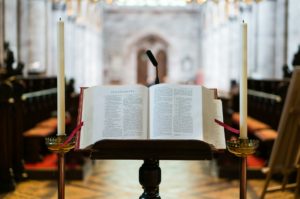It may come as a surprise to learn that small groups, that is, men and women gathering to study Scripture and to enjoy fellowship together, played a significant part in the sixteenth-century Reformation. This was true on the peninsula of Italy, as it was in territories north of the Alps.
Many people are unaware that southern Europe witnessed a movement of gospel renewal in which small groups played a particular role (at least until the Inquisition in 1542). This movement was stimulated by numerous factors, including an abysmal standard of morality by Pope Alexander VI and his Borgia family, the Medici papacies which had made the city of Rome into a veritable haven of humanism, the popularizing of democratic ideals by public intellectuals such as Erasmus (who visited Italy in the years 1506-09), and the distribution of Protestant tracts that questioned the accuracy of Roman Catholic Church doctrine.
On account of these factors, there was widespread recognition of the need for biblical reform. In the opening address at the Fifth Lateran Council in 1512, for example, the Augustinian Cardinal Giles of Viterbo (1469-1532) declared: “Men must be changed by religion, not religion by men.” This spiritual uneasiness, common to the whole of Europe at the start of the sixteenth century, sent thoughtful Christians to reexamine the roots of their faith. While this examination produced a wide range of initiatives for stimulating spiritual renewal, a central thrust of the movement focused on the necessity of Christians to gather together and study the Bible.
Here is an example of a Bible study group which met in Naples, Italy between 1536 and 1541. Led by the Spaniard Juan De Valdés, this circle of friends often picnicked together in the countryside on Sunday. It comprised influential theologians and laypeople alike, including Bernardino Ochino, General of the Capuchins and the most famous preacher in Italy, Peter Martyr Vermigli, then abbot, soon-to-be Reformed theologian, Pietro Carnesecchi, a canon lawyer, and the Countess of Fondi, Giulia da Gonzaga. So what did this group do in their meetings?
Fortunately, we have some idea from extant writings, the most important of which is the work of Valdés titled One Hundred and Ten Considerations, a volume that functioned as a basis of discussion and tool for discipleship among the group’s members. In their gatherings, they studied books of the Bible (starting with Romans followed by 1 Corinthians). The discussed theology, and especially wrestled through the doctrine of justification by faith alone. They also read pseudonymous works from Northern Reformers, such as Luther, Bucer, and Zwingli. They prayed, debated, and conducted evangelistic outreach. Vermigli, for instance, shared the gospel with Galeazzo Caracciolo, a convert who became a Reformer and went on to found the Italian Church in Calvin’s Geneva. By most standards, this was a thriving small group.
Perhaps the most poignant summary of Valdés Neapolitan fellowship was expressed decades later by one of its members, Pietro Carnesecchi, before he was publically beheaded and burned for heresy by the Inquisition (1567). Describing the quality of friendship, theological interaction, and enthusiasm for biblical renewal, Carnesecchi described the Valdésian gatherings as a “regno di Dio,” “kingdom of God.”
Here is the theological pearl: when God’s people prioritize gathering to study Scripture and theology—exchanging ideas in a bond of warm-hearted Christian fellowship—small groups will enjoy spiritual renewal that enriches our present and endures through every tomorrow.





